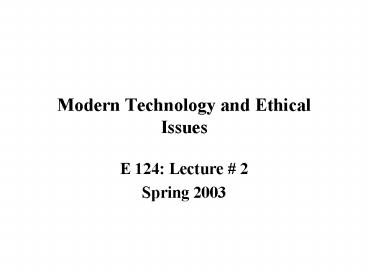Modern Technology and Ethical Issues - PowerPoint PPT Presentation
1 / 18
Title:
Modern Technology and Ethical Issues
Description:
The Oxford Dictionary of the English Language (OED) defines technology as, 'a ... The rights to employment and medical insurance. Privacy Issues and the Internet ... – PowerPoint PPT presentation
Number of Views:53
Avg rating:3.0/5.0
Title: Modern Technology and Ethical Issues
1
Modern Technology and Ethical Issues
- E 124 Lecture 2
- Spring 2003
2
Ethics and the Impact of Technology on Society
- What do we mean by ethics?
- What do we mean by technology?
- What do we mean by impact?
- What do we mean by society?
3
What Do We Mean by Impacts?
- Intended impacts (benefits) influenced and
determined by our assumptions, values and
beliefs. - Undesirable consequences (factual).
- Imprecision in data and models (risk).
- Unintended impacts (axiological).
- Indeterminacy and ignorance.
4
What Do We Mean by Technology?
5
What Is Technology?
- The Oxford Dictionary of the English Language
(OED) defines technology as, a discourse or
treatise on an art or arts the scientific study
of the practical or industrial arts. - Its roots come from the Greek language that
combines systematic treatment with art or
craft.
6
Technology (Continued)
- Ian Barbour defines technology as
- the application of organized knowledge to
practical tasks by ordered systems of people and
machines.
7
Technology (Continued)
- Organized knowledge includes practical
experience, invention and scientific theories. - Practical tasks include both the production of
material goods and the provision of services,
i.e. the products. - Application by ordered systems of people and
machines refer to the process of engineering and
the tools engineers (and others) use.
8
What Does Technology Mean?
- Drawing from Heidegger and his interpreters,
rather than technology being an object or
complex of objects and techniques, (which are a
means to an end) that seem passive and activated
by us only
9
The Meaning of Technology (Continued)
- it is an autonomous organizing activity with
which humans themselves are organized. the
essence of technology reveals it as a vast system
of organization - which encompasses us rather than standing
- objectively and passively ready for our
direction and control
10
What Is Science?
- Protocol of methodologies for the discovery of
fact through measurement, peer review, public
validation and debate, and by replication by
others of the same experiments. - Seems to be the best fact-finding technique
developed by humans.
11
Where Do Ethical Issues Arise?
- Genetically Modified Organisms and Transgenic
Plants in Agriculture. - Global Warming.
- High-level Radioactive Waste Disposal.
- Stem Cell Research and Cloning.
- Privacy Issues on the Internet.
- Nanotechnology
12
Genetically Modified Crops and Transgenic Plants
in Agriculture.
- Cultural shifts in farming due to the
introduction of terminator seeds. - The anecdotal evidence of allergies to
genetically modified crops. - The lack of an adequate risk assessment
methodology to quantify unintended ecological
consequences. - Resistance of intestinal bacteria to antibiotics.
- The preservation of natural genetic crop-lines.
13
High-level Radioactive Waste Disposal.
- Inter-generational risk.
- The disparity between those who reap the benefits
of nuclear power and those who take the burden of
the waste. - Proliferation of plutonium and nuclear weapons.
- The uncertainty in our ability to predict and
forecast over geological time scales.
14
Global Warming
- Green-house gas emission reduction disparity
between the developing and developed countries. - The indeterminacy of environmental and ecological
impacts of fossil fuel use and remediation
measures. - Paradigmatic science vs. regulatory science.
- The disparity among nations/regions in the use of
the worlds energy and other resources.
15
Stem Cell Research and Cloning
- Preservation versus modification of the human
germ line. - When does life begin?
- Who owns biological information (genomics) and
biological materials (cells, tissues, organs). - Bio-terrorism, eugenics and the predisposition to
diseases. - The rights to employment and medical insurance.
16
Privacy Issues and the Internet
- Intellectual property rights regarding everything
from music to software. - Rights to privacy regarding search patterns,
consumer purchasing and personal (e.g. medical)
records.
17
Nanotechnology
- Regulation (regulation verses free enterprise)
- Robustness of the technology against accidents
(biological interfacing, self-replication,
environmental issues) - Misuse (warfare, cosmetic enhancement)
18
What Do We Mean by Society?
- How do we draw boundaries?
- Who says what the boundaries are?
- Are we concerned with local or global impacts?
Inter-generational impacts? - Spatial/temporal?
- Multi-stakeholder versus individual?
- Who is the public? Who represents the public?










![[PDF] DOWNLOAD Bioethics: The Dilemmas of Modern Medicine PowerPoint PPT Presentation](https://s3.amazonaws.com/images.powershow.com/10085316.th0.jpg?_=202407250512)




















